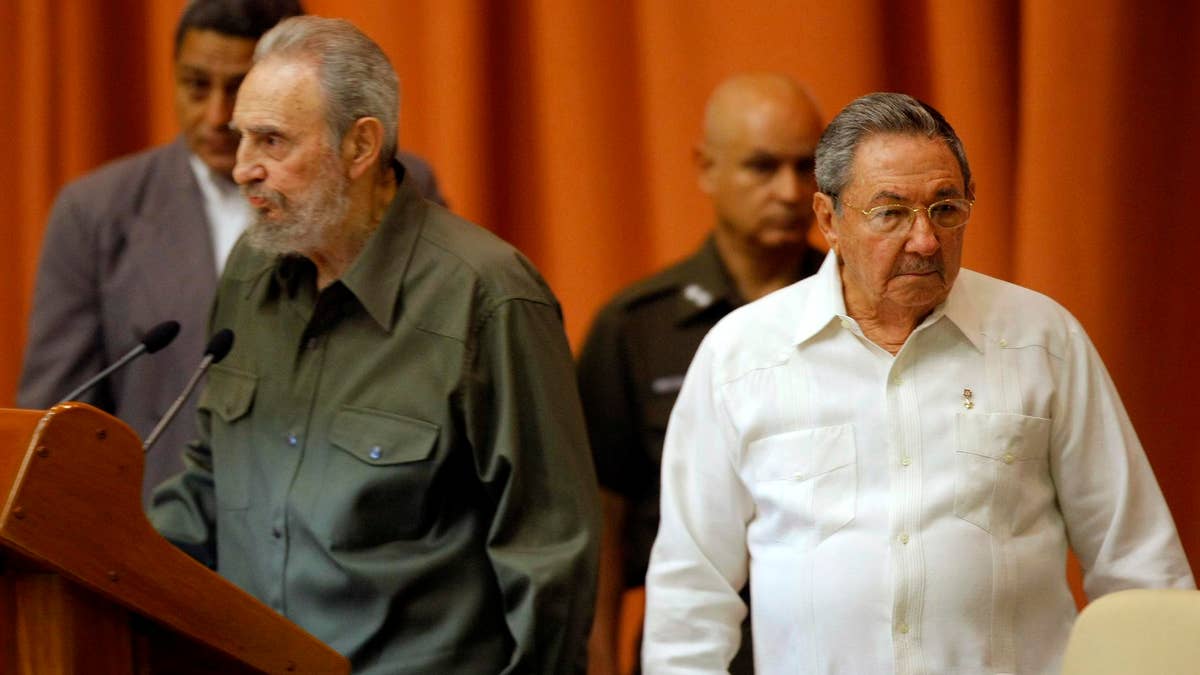
Fidel Castro, left, and his brother Raul Castro attend a special session of parliament in this 2010 file photo. (AP)
HAVANA – Fidel Castro's son reportedly has said his father is in good shape despite nearly four months of public silence that in recent days set the Twitterverse aflame with speculation about the 86-year-old former president's health.
"The Comandante is well, going about his daily life, reading, doing his exercises," Alex Castro was quoted as saying by Arlin Alberty Loforte, a reporter for the Venceremos weekly newspaper in the eastern city of Guantanamo.
The exchange came at an exhibition of portraits that the younger Castro, a photographer, has taken of his father since 2010. It was reposted by a prominent pro-government blogger known as Yohandry Fontana, and state news agency AIN also reported Alex Castro's comments.
Speculation about Fidel Castro's purported decline, which seems to surface every few months, hit the rumor mill again this week when he did not publicly congratulate ally Hugo Chavez on winning re-election in a hard-fought Venezuelan presidential race.
"Does anybody know if (hash)FidelCastro has sent congratulations to (hash)HugoChavez?" dissident blogger Yoani Sanchez tweeted earlier this week. "Because some silences are resounding."
Castro has not been seen in public since video images showed him greeting a visiting Pope Benedict XVI in late March, and the last of his essays, known as "Reflections," was published June 19.
The most recent of those had taken on a brief, esoteric nature that left Cubans and analysts alike scratching their heads, and exiles in Miami speculating about his grasp on reality.
Castro has been mostly out of sight since he left office in 2006 due to a life-threatening intestinal condition. His health and location are secret, and at times the only word on how he's doing comes in rosy assessments from his close friend Chavez.
On Oct. 4, Chavez told reporters Castro had been in touch to remark on TV coverage he'd seen earlier of a massive campaign rally in Caracas.
"Fidel sent a message, Fidel says from Havana that he has never seen anything like what he saw here today under the rain. ... Thank you Fidel," Chavez said, "for your message and for the many messages that have arrived."
The latest round of rumors, which apparently originated Wednesday on a Florida exile website that did not identify its source, spread like wildfire on Twitter.
Fidel was brain-dead, early versions had it. Then, he had died. No, he was on life-support. Traffic for the FidelCastro hashtag boomed as exiles rejoiced, Castro-backers pooh-poohed the rumors and most simply asked whether anyone could confirm it was true.
Venezuelan journalist Nelson Bocaranda added fuel Thursday when he wrote that an announcement of Castro's death would come within the next 72 hours.
Earlier this year Bocaranda broke the news that Chavez had returned to Cuba for treatment for a cancer relapse. That was at first hotly denied by Venezuelan officials, then grudgingly acknowledged when the president himself confirmed the return of his illness.
Cuban officials did not reply directly to a request for comment this week, instead referring The Associated Press to a blog post by Fontana ridiculing the rumors.
"The CIA tried to kill (Castro) more than 600 times, the media is nearly at the CIA's level. And Twitter, about 30 or 40 times," Fontana said via Twitter.
Fontana wrote in August that Castro was collaborating on a book with Chavez to dispel another round of rumors. However it later turned out that the book was a transcript of Chavez speeches being compiled by Cuban journalists, and it was not clear that Castro's involvement went beyond simply reading over their work.
In January, state-run website Cubadebate accused Twitter of helping spread similar rumors about Castro, and called exiles who seized upon it "necrophiliac counterrevolutionaries."
Previous Internet chatter about Castro includes an August 2011 spam email titled "Fidel is Dead" that had a virus embedded.
___
Associated Press writer Peter Orsi is on Twitter at www.twitter.com/Peter_Orsi
